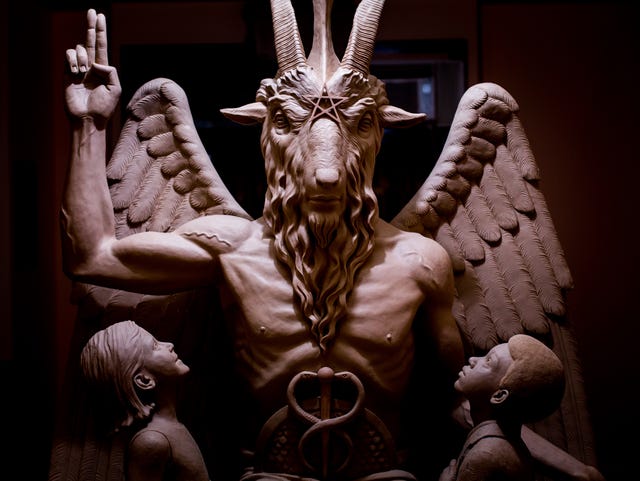The public square dominated by Christianity. We should welcome efforts from the Satanic Tempre to have religious minorities take part in public life.
JAY WEXLER | OPINION CONTRIBUTOR | 6:00 am EDT June 7, 2019
Satan has been having a hell of a year. Just two months ago, the IRS announced that it now recognizes the Satanic Temple (TST) as a bona fide religion, qualifying the Salem, Massachusetts, based organization for tax exempt status.
In Penny Lane's documentary "Hail Satan?" (released in April) viewers learn how TST has challenged the Christian domination of public life in the United States. When government puts up a Ten Commandments monument on public property, TST might ask to put up its own goat-headed monument nearby. When government starts a legislative session with a Christian prayer, TST might apply to give a satanic invocation at a later session. When the Christian Evangelical Fellowship starts up a Good News Club to proselytize public elementary school students, TST might seek to introduce an After School Satan club in a classroom down the hall.

The $100,000 Baphomet statue depicts Satan as a winged, goat-headed figure.
THE SATANIC TEMPLE VIA AP
Read more commentary:
So Yale Law School endorses anti-religious bigotry now?
Don't let Trump hide brutal LGBTQ record behind 'religious freedom' rhetoric in 2020 race
The Satanic Temple deserves the attention and accolades that it has received for its efforts, but it is important to recognize that TST is not alone. Indeed, TST's actions are part of a broader social movement brought about by two parallel developments of the past several decades:
► An increasingly conservative Supreme Court that has largely torn down the wall between church and state. For instance, in the past two decades, the Court has held that local town boards can start their meetings with prayers to Jesus Christ and required public schools opening up their classrooms for after-school activities to include religious groups that actively proselytize young children.
► A society that has become more and more religiously diverse.
In this highly religiously pluralistic post-separation nation, a wide range of religious minorities, including Atheists, have started demanding their rightful place in public life alongside the Christian majority.
The actions of other religious minorities may not have made quite the splash as those of TST (invoking Satan does have an uncanny way of attracting attention) but they are no less important. For instance, for many years the Veterans Affairs had refused to approve the Wiccan Pentacle as a symbol that could be included on the headstones of fallen soldiers buried in national cemeteries. It was only after the persistent demands of activists, particularly Wiccan Priestess Selena Fox of Wisconsin's Circle Sanctuary, and a lawsuit brought on their behalf by Americans United for the Separation of Church and State, that the VA changed its policy.
Americans United played an important role in another similar initiative. After the Supreme Court held in a 2014 decision called Town of Greece v. Galloway that town boards can invite religious leaders to start off their meetings with explicitly sectarian prayers, as long as those boards don't discriminate on the basis of religion when they extend their invitations, Americans United started its "Operation Inclusion" to assist Atheists wanting to give their own invocations before the same town boards.
Since then, secularists have given countless invocations across the country, providing visibility to the 23% of Americans who identify as believing in no religion at all (roughly the same percentage as Americans who identify as Catholic or Evangelical) and spreading the word that it is possible to be a good person without worshipping any god whatsoever.
Why we should applaud the Satanic Temple
These efforts of TST and other religious minorities should be applauded, encouraged and welcomed. Usually one of two things happens when a minority group asks to take part in public life alongside the Christian majority.
Sometimes the majority shuts down the religious practice altogether, as when Phoenix decided to stop starting its sessions off with a prayer rather than allowing two Satanists to give an invocation. Other times, the majority lets the minority in, resulting in a more pluralistic public square. Either way, though, the result is clearly preferable to a public square dominated entirely by Christianity.
This month, the Supreme Court will likely uphold a 40-foot high World War I monument in the shape of a cross on public land in Maryland. The court clearly fears that striking down the cross will result in Christian monuments being bulldozed across the nation. But what we've learned from TST and other minority groups is that the choice between leaving up such monuments and totally destroying them is a false one.
A decision striking down the cross would instead invite the government to designate the public lands around Christian displays as forums for private expression, thus allowing minority groups to place their own monuments near the Christian ones and facilitating religious pluralism in the place of established Christianity. Such a solution would of course be messy, resulting in a kind of public religious cacophony, but it would be fairer, more equal, and far truer to the state of religious diversity that actually exists in our non-Christian nation.
No comments:
Post a Comment